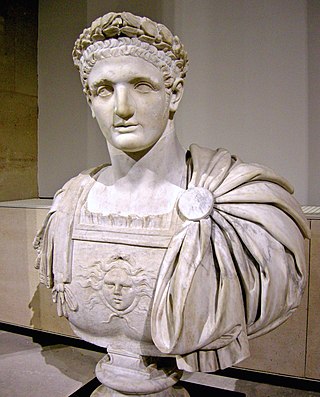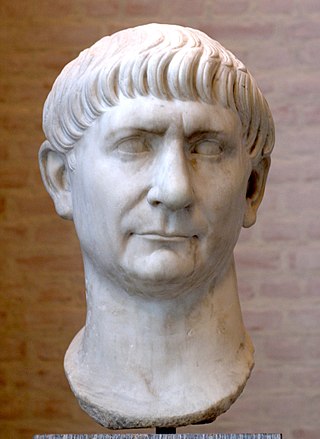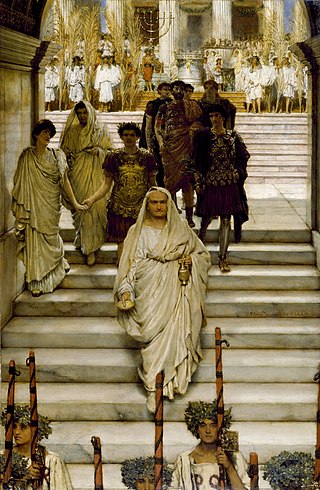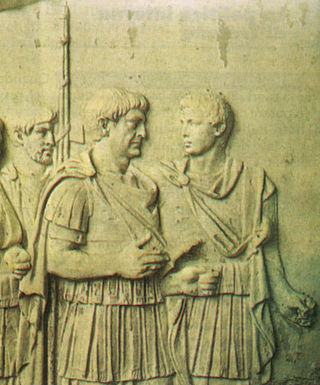Related Research Articles

Domitian was Roman emperor from 81 to 96. The son of Vespasian and the younger brother of Titus, his two predecessors on the throne, he was the last member of the Flavian dynasty. Described as "a ruthless but efficient autocrat", his authoritarian style of ruling put him at sharp odds with the Senate, whose powers he drastically curtailed.

Trajan was a Roman emperor from AD 98 to 117, the second of the Five Good Emperors of the Nerva–Antonine dynasty. He was a philanthropic ruler and a successful soldier-emperor who led the Roman Empire to its greatest territorial extent by the time of his death. He was given the title of Optimus by the Roman Senate.

The 90s was a decade that ran from January 1, AD 90, to December 31, AD 99.
AD 98 (XCVIII) was a common year starting on Monday of the Julian calendar. At the time, it was known as the Year of the Consulship of Augustus and Traianus. The denomination AD 98 for this year has been used since the early medieval period, when the Anno Domini calendar era became the prevalent method in Europe for naming years.

Titus Caesar Vespasianus was Roman emperor from 79 to 81. A member of the Flavian dynasty, Titus succeeded his father Vespasian upon his death, becoming the first Roman emperor to succeed his biological father.

Decebalus, sometimes referred to as Diurpaneus, was the last Dacian king. He is famous for fighting three wars, with varying success, against the Roman Empire under two emperors. After raiding south across the Danube, he defeated a Roman invasion in the reign of Domitian, securing a period of independence during which Decebalus consolidated his rule.

The Praetorian Guard was an elite unit of the Imperial Roman army that served as personal bodyguards and intelligence agents for the Roman emperors.

The Flavian dynasty, lasting from AD 69 to 96, was the second dynastic line of emperors to rule the Roman Empire following the Julio-Claudians, encompassing the reigns of Vespasian and his two sons, Titus and Domitian. The Flavians rose to power during the civil war of AD 69, known as the Year of the Four Emperors; after Galba and Otho died in quick succession, Vitellius became emperor in mid 69. His claim to the throne was quickly challenged by legions stationed in the eastern provinces, who declared their commander Vespasian emperor in his place. The Second Battle of Bedriacum tilted the balance decisively in favor of the Flavian forces, who entered Rome on 20 December, and the following day, the Roman Senate officially declared Vespasian emperor, thus commencing the Flavian dynasty. Although the dynasty proved to be short-lived, several significant historic, economic and military events took place during their reign.

Histories is a Roman historical chronicle by Tacitus. Written c. 100–110, its complete form covered c. 69–96, a period which includes the Year of Four Emperors following the downfall of Nero, as well as the period between the rise of the Flavian dynasty under Vespasian and the death of Domitian. However, the surviving portion of the work only reaches the year 70 and the very beginning of the reign of Vespasian.
Titus Flavius Titi filius Titi nepos Clemens was a Roman politician and cousin of the emperor Domitian, with whom he served as consul from January to April in AD 95. Shortly after leaving the consulship, Clemens was executed, allegedly for atheism, although the exact circumstances remain unclear. Over time, he came to be regarded as an early Christian martyr.

Lucius Licinius Sura was an influential Roman Senator from Tarraco, Hispania, a close friend of the Emperor Trajan and three times consul, in a period when three consulates were very rare for non-members of the Imperial family. The dates of two of these consulates are certain: in 102 and 107 AD he was consul ordinarius; the date of his first consulate, as a suffect consul has been debated. Fausto Zevi postulated that he was also suffect consul in 97, based on a plausible restoration of part of the Fasti Ostienses, which reads "..]us". However, two more recently recovered fragments of military diplomas show that the name of this consul is L. Pomponius Maternus, who is otherwise unknown. Most authorities have returned to endorsing C.P. Jones' surmise that Sura was consul for the first time in the year 93. He was a correspondent of Pliny the Younger.

Trajan's First Dacian War took place from 101 to 102.

Trajan's Second Dacian War was fought between 105 and 106 because the Dacian king, Decebalus, had broken his peace terms with the Roman Emperor Trajan from the Trajan's First Dacian War.
Sextus Attius Suburanus Aemilianus, commonly abbreviated as Suburanus, was a Roman eques who helped Trajan consolidate his position as emperor. Originally procurator of Gallia Belgica, Suburanus was appointed prefect of the Roman imperial bodyguard, known as the Praetorian Guard, in the year 98 and brought this important military unit under Trajan's control. For his achievement, at the end of his command of the Guard, Suburanus was adlected into the Roman senate inter praetores, then held the suffect consulship as the colleague of the consul posterior Quintus Articuleius Paetus in AD 101.
Titus Petronius Secundus was a prefect of the Roman imperial bodyguard, known as the Praetorian Guard, under emperor Domitian, from 94 until 96. Prior to becoming Praetorian prefect, Petronius had served as governor of Roman Egypt from 92 until 93.

The history of the Roman Empire covers the history of ancient Rome from the fall of the Roman Republic in 27 BC until the abdication of Romulus Augustulus in AD 476 in the West, and the Fall of Constantinople in the East in AD 1453. Ancient Rome became a territorial empire while still a republic, but was then ruled by Roman emperors beginning with Augustus, becoming the Roman Empire following the death of the last republican dictator, the first emperor's adoptive father Julius Caesar.

Nerva was a Roman emperor from 96 to 98. Nerva became emperor when aged almost 66, after a lifetime of imperial service under Nero and the succeeding rulers of the Flavian dynasty. Under Nero, he was a member of the imperial entourage and played a vital part in exposing the Pisonian conspiracy of 65. Later, as a loyalist to the Flavians, he attained consulships in 71 and 90 during the reigns of Vespasian and Domitian, respectively. On 18 September 96, Domitian was assassinated in a palace conspiracy involving members of the Praetorian Guard and several of his freedmen. On the same day, Nerva was declared emperor by the Roman Senate. As the new ruler of the Roman Empire, he vowed to restore liberties which had been curtailed during the autocratic government of Domitian.
Lucius Julius Ursus was a relative of the Flavian dynasty, who was originally one of the equites who held several imperial appointments, but afterwards was promoted to the Roman senate. He was suffect consul three times: once under Domitian and twice under Trajan.
Gaius Calpurnius Piso Crassus Frugi Licinianus was a Roman senator who lived in the 1st and 2nd centuries. He served as suffect consul for the nundinium January to April 87, replacing the emperor Domitian. Crassus is best known for being suspected of plotting against the emperor Nerva, as a result of which he spent much of the rest of his life exiled from Rome to various locations.
Titus Flavius Norbanus was a Roman equites who was active during the reign of Domitian. He is known for his activities while holding two imperial posts: governor of Raetia, and Praetorian prefect.
References
- ↑ Brian Jones (11 September 2002). The Emperor Domitian. Routledge. pp. 259–. ISBN 978-1-134-85313-7.
- ↑ Cassius Dio, Roman History 68.5.4